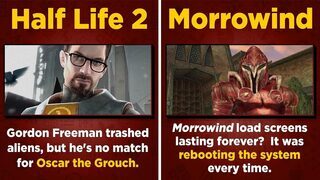5 Tiny Secrets That Made Great Games Playable

The general public thinks of great games as a work of genius development teams who can only write perfect code that never fails to work as intended. In reality, there's a lot of inventiveness that needs to come together with an incredible amount of luck for players to get gaming gold ...
The Dogs of Fable II Were Made More Realistic Via Intentionally Bad Coding
Whereas the original Fable sends the would-be hero on a mostly solitary quest, Fable II introduces a companion in the unexpected form of a dog. This creature performs such neat tricks as sitting ...

... standing on two feet ...

... and playing being dead ...

What our best friend couldn't do -- even before it's pointlessly cruel death -- was to turn properly. Instead, he'd get stuck moving around in circles. Which seems like kind of a big deal when your game's big selling point was meant to be a companion that doesn't straight up suck. Saddened that they didn't just opt for coding a cat in the first place, the team got to work. But, upon looking at one dog in real life for what must've been no longer than two seconds, they realized that, yeah, that's just how actual dogs behave. They decided to let it stay just as it was, and the move was totally validated when not a single playtester complained that the dog was behaving in any sort of undogly way.
No Dumpster Fires allowed in Half-Life 2: Episode Two
When playing through certain a segment of Half-Life 2: Episode Two, you will walk past a weirdly noisy dumpster. The noises result from an environmental trick to make it look like there was something living inside it when there wasn't. Still, one beta tester who noticed it was kind enough to come close and feed the alien Oscar the Grouch living inside a grenade -- as one should.

Much to the surprise of the good samaritan, the dumpster turned out to have a hell of a QB arm and was quick to hurl the grenade back at the player (and get scouted by the Broncos).

The tester reported it to the developers, who in turn found this hardcore form of hunger strike so hilarious they decided to put it in the final version of the game just as it was.
Titan Quest is an Accidental Terry Pratchett Adaptation
If there's one thing the US and the rest of the world are in agreement on, it's that time should be measured in ... uh ... whatever units it is that we all use. That, however, is not the case in the mystical world of Titan Quest. Shortly before launch, the makers of Titan Quest ran into some problems that prevented the game from delaying actions triggered by the player. To put it simply: did you walk over a trap that should give you three seconds before rolling a boulder towards you? Too bad; you're already dead.
With little time to get things to work out, they did what any sensible human would -- resort to animal slavery. ("Hey, it's better than other kind!") Yes, turns out that Titan Quest featured squirrel NPCs lying around with animations that the devs could easily employ to set the game's event pacing. They just created an entire army of squirrels and rats, doused them in invisible paint, and placed them whenever a lever or something similar needs to be pulled.
So, whenever you play Titan Quest, and something happens, take a squirr-- uh, second to look around to thank poor animals that make the game work.
The Elder Scrolls III: Morrowind for the Xbox Pulled Moves on the Player's Back
Morrowind for the original Xbox was a massive achievement, in ways most weren't aware of for nearly 20 years. Though a powerhouse at the time of its release, the Xbox just wasn't meant to run a game capable of going toe-to-toe with the best PC hardware of the time.

So how did the wizards at Bethesda manage to get the console to run the game without it fainting after every 10 minutes? Well, in the words of Mr. Bethesda Todd Howard himself, they kind of didn't. Running Morrowind on the Xbox as if it were a PC was a sure-fire way of clogging up more memory than the Xbox had, which would inevitably result in a crash. To prevent this, the devs just created clever ways of diverting player's attention, like random-ass loading screens that they were secretly using to reboot the console to free up enough memory to get the game to just work.


Hellblade: Senua's Sacrifice Used Actual Psychology to Instill Paranoia
Hellblade Senua's Sacrifice is the surprise hit of 2017 that captivated players by making them pay to feel what millions of people worldwide pay millions of dollars to avoid. Senua's sacrifice puts players in the shoes of the titular Senua, a warrior suffering from numerous psychological ailments. From the start of production, the developers consulted with actual psychiatrists to try and get players to accurately feel the effects of paranoia. Despite all the entrancing visual and auditive cues they put in the game ...
... no actual gameplay mechanic got players to feel like they really were Senua than her progressively rotting arm.

It gets progressively infected by a mysterious ailment, and the game says that failing Senua's trials will cause the corruption to delete the game's save file.

This unexpected raising the stakes got a lot of players way more invested in the adventure but also caused so many others to fall prey to paranoia and go ranting about it on the Internet. After total chaos had engulfed all discourse surrounding the game, players discovered that the entire save-deleting shenanigan was just a bluff devised by the developers.
Top image: Bethesda Softworks, Valve